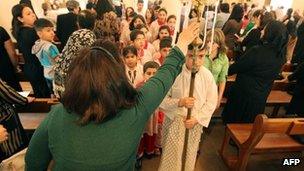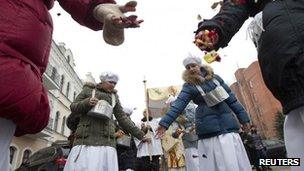Pope Francis delivers Easter plea for peace
- Published
Pope Francis: "We ask the risen Jesus... to change hatred into love"
Pope Francis has delivered a passionate plea for peace in his first Easter Sunday message since being elected.
Francis used his "Urbi et Orbi" address to call for peace in Africa, Asia, the Middle East and across the globe.
He singled out "dear Syria", saying: "How much blood has been shed! And how much suffering must there still be before a political solution is found?"
Easter is the most important festival in the Christian calendar and pilgrims have attended church across the world.
In Iraq, Catholics flocked to churches amid tight security. Some 200 worshippers celebrated Mass at St Joseph Chaldean Church in Baghdad
In South Africa, many congregations included ailing former President Nelson Mandela in their prayers
In a message for Easter, UK Prime Minister David Cameron praised the "incredible role" played by Christian churches and organisations in Britain and around the globe
'Divided by greed'
Pope Francis, formerly Buenos Aires Archbishop Jorge Mario Bergoglio, was elected on 13 March, becoming the first non-European pope for almost 1,300 years.
He replaced Benedict XVI, who held the office for eight years and became the first pontiff in more than 700 years to resign, saying he no longer had the physical strength to continue.
In his Urbi et Orbi (To the city and the world) speech, Pope Francis began with a simple "Happy Easter!"
The 76-year-old Pope, who has begun his tenure by emphasising humility, went on: "Christ has risen! What a joy it is for me to announce this message... I would like it to go out to every house and every family, especially where the suffering is greatest, in hospitals, in prisons."
Later in his speech, Pope Francis said: "We ask the risen Jesus, who turns death into life, to change hatred into love, vengeance into forgiveness, war into peace."
The Pope then mentioned troubled regions of the world in turn.

"Peace for the Middle East, and particularly between Israelis and Palestinians, who struggle to find the road of agreement, that they may willingly and courageously resume negotiations to end a conflict that has lasted all too long.
"Peace in Iraq, that every act of violence may end, and above all for dear Syria, for its people torn by conflict and for the many refugees who await help and comfort."
For Africa, the Pope referred to Mali, Nigeria - "where attacks sadly continue" - the Democratic Republic of Congo and the Central African Republic.
He added: "Peace in Asia, above all on the Korean peninsula: may disagreements be overcome and a renewed spirit of reconciliation grow."
Pope Francis concluded by saying: "Peace in the whole world, still divided by greed looking for easy gain, wounded by the selfishness which threatens human life and the family, selfishness that continues in human trafficking, the most extensive form of slavery in this 21st Century."
BBC Rome correspondent, Alan Johnston, says the Pope has reinforced his image as a man of simple, down-to-earth tastes, not wearing the more ostentatious of papal costumes and, for the moment, not moving into the grandiose papal apartments.
One pilgrim in Rome on Sunday, Briton Tina Hughes, said that Francis represented a "new beginning".
"I think he brings something special. He connects with people. I feel good about him," she told Reuters.
In the days before Easter, the Pope had reached out to women and Muslims.
During a Holy Thursday Mass at a youth detention centre he washed and kissed the feet of 12 people, including two girls and two Muslims, and in a Good Friday procession referred to the "friendship of our Muslim brothers and sisters" in the Middle East.

Belarusian Catholics celebrate in Minsk
But our correspondent says that, after Easter, the Pope will have to begin tackling the key issues facing the Catholic Church, such as reforming a Vatican bureaucracy riven by infighting and allegations of corruption, and tackling the issue of clerical sexual abuse.
Vatican watchers will also be keeping a keen eye on new appointments to key positions.
In his Easter homily, the Latin Patriarch of Jerusalem, Fouad Twal, invited the Pope to visit.
The patriarch, the most senior Roman Catholic cleric in the Holy Land, also urged the international community to take "concrete and effective decisions to find a balanced and just solution for the Palestinian cause, which lies at the heart of all the Middle East's troubles".